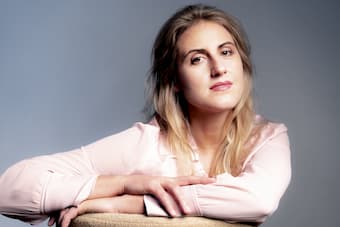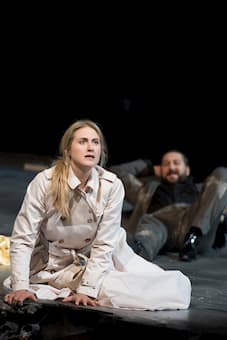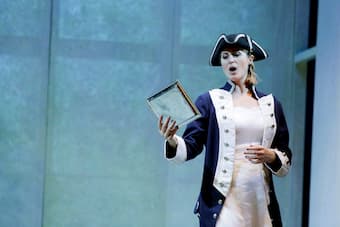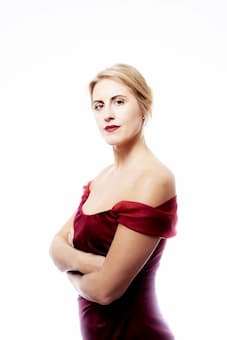Heart and Home

Jacquelyn Wagner © Harald Hoffmann
American soprano Jacquelyn Wagner is getting ready for her first opera appearance since the Coronavirus pandemic, singing Alice in Verdi’s Falstaff in Malmö, Sweden. After a long enforced break she is excited to be back, and talks to me about how it feels to finally be working again.
‘It’s fantastic,’ she says, talking to me a few days after the first rehearsal with the orchestra. ‘It’s amazing to finally be in rehearsals and see colleagues and hear music, and to hear and feel that again is just wonderful.’
The production in Sweden was redesigned by the director, Lotte de Beer, to be suitably socially distanced. The orchestra has a few less string players, but apart from that, everything feels fairly normal according to Jacquelyn. ‘You notice the difference in balance a little bit, but it’s not huge.’
This opera role comes at a time for Jacquelyn, like many musicians, following a long period of being unable to work. ‘When everything was cancelled I spent weeks at home in shock,’ she recalls. ‘It was really difficult to find a routine again, to find reasons to practise. I lost a bit of hope towards the end but thankfully my husband [a trumpeter] is quite positive, he was saying ‘It’s ok, we’ll come back! Music has to happen.’

Lohengrin – Salzburg 2020 © Anna-Maria Löffelberger
Her first work since the lockdown came in the form of a Brahms Requiem in Austria: ‘To hear the sound of the choir again, especially in a piece like the Brahms Requiem, brought tears to my eyes.’
Jacquelyn is based in Berlin, having come to Europe to study in 2005. She is over half German, and so imagined she would fit in fairly easily in Germany – but the move didn’t come without its culture shock.
‘I connect very much with Europeans, especially Germans – I’m more than half German from all the different parts of my family so I feel like I connect with the people, with the culture, I can understand them well. But at the beginning I underestimated how difficult the language was going to be.’
‘I thought it would be quite easy since I knew how to pronounce [German], but that was my ignorance! Things are different in Europe, people are not as outgoing, especially to strangers, and that was really hard for me to understand. When I go back home I see how open people are – you can go up to the cashier at the supermarket and talk the whole time about anything; if I take a walk with my mother in my neighbourhood you say hi to everyone you see. That was the biggest part – I initially took it as unfriendliness but of course it’s not that, it’s just people aren’t as open as Americans.’
‘My heart is still in America but my home is here,’ she laughs.
Living in Germany and speaking the language on a daily basis helps Jacquelyn with her operatic work in that language.
‘I always thought I would sing a lot of German repertoire but I didn’t realise how well it would fit me. I feel most comfortable with Strauss and Weber, this German repertoire, and I love it because [when you speak the language] you can connect with a piece so much deeper.’
‘I connect with a piece in German much more than a piece in Italian. You still connect with Italian and know it really well but when you have a good facility with the language it really does make a difference how you learn it.’

Cosi fan tutte, Oper Köln © Paul Leclaire, 2016
For Jacquelyn, this linguistic ease also carries over into how comfortable she feels with the musical styles themselves.
‘I feel the most at home with Mozart and Strauss,’ she says. ‘That’s where I can just open up – it feels fantastic, you just ride the wave.’
‘People often ask, ‘Isn’t it difficult to sing some Mozart and then turn around and sing Strauss?’ but I don’t find it difficult at all. To sing Mozart you have to really figure out how to make the voice work as economically as possible, to make all the beautiful lines and dynamics, but I think that Strauss to me is simply opening up another gear. It’s sung in the same way, you just have to know how to be able to expand the voice a little more than in Mozart, when you often need a finer sound. In Strauss, you just open it up but it’s sung the same way, for me at least.’
A similar approach was used by Jacquelyn’s teacher, a singer famous for her big Wagnerian roles, roles which are infamous for the stamina they command from the performer. Speaking of singing Elsa in Lohengrin, Jacquelyn remembers ‘it’s such a physical thing to get through an evening.’
‘What [my teacher] said about getting through those huge roles was that she also took it from the ‘Mozart’ way of singing: if you let the voice get really big and push as much volume as you can at all times then you lose the sensibility of the voice and actually you compromise the integrity of what you’re singing, and the integrity of your voice at the same time. She always approached it with a fine controlled [technique] – if you put the resonance in the right way it’s very economic. That’s what I try to implement.’
This isn’t just when she’s singing, either: Jacquelyn has to take care of her body and be aware of how her lifestyle can affect her voice, particularly in the midst of a big opera run. She is particularly mindful of her sleep schedule, and exercises regularly, enjoying yoga and swimming in particular.

© Harald Hoffmann
‘It’s making sure you’re really disciplined with a lot of sleep and exercise,’ she says, ‘but also daily practising – making sure you’re doing the right kind of practice, that it’s not too much, to keep the flexibility in the voice and also having the strength to sing over the orchestra.’
I ask Jacquelyn if it was strange to get back into the swing of things after the pandemic.
‘At the beginning of the pandemic I had a few things I was practising for but not a lot of things were coming up. I didn’t practise as much as I normally would so it took me a while to really make sure I was right where I needed to be.
‘I haven’t had this since I was a student – when you’re not performing all the time you just get out of that rhythm of how to practise, or even the desire to practise, if there’s nothing to look forward to. That was the challenge, but I’m really happy that we’re all in shape now, that we have a show opening in two weeks.
‘Singing with the orchestra feels so great, and when the voice feels like it’s back to where it was before the pandemic hit, I feel like I know myself a little more again.’
Jacquelyn spends a lot of her spare time catching up with her family, who are all back in the States – ‘I’ve got three other brothers and sisters, and I keep up with my parents and a few close friends’ – and away from that? ‘Well, there’s Netflix. Everyone watches Netflix, you can’t get away from Netflix,’ she chuckles.
Every performance of Falstaff from Malmö, opening on 7 November, is being streamed for those who can’t make it in person – more details can be found here.
For more of the best in classical music, sign up to our E-Newsletter




